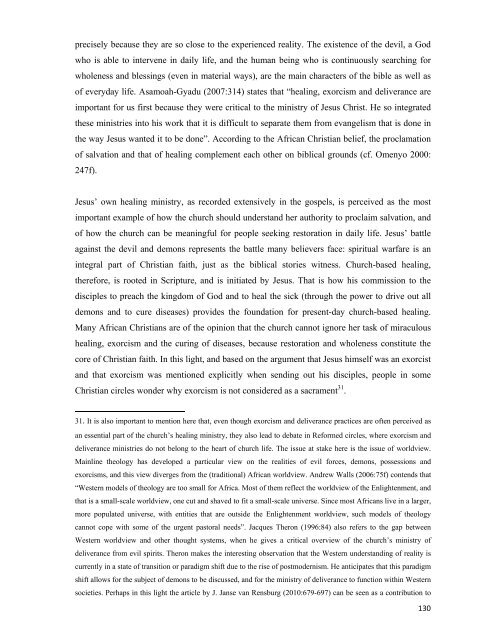spirit and healing in africa - University of the Free State
spirit and healing in africa - University of the Free State
spirit and healing in africa - University of the Free State
Create successful ePaper yourself
Turn your PDF publications into a flip-book with our unique Google optimized e-Paper software.
precisely because <strong>the</strong>y are so close to <strong>the</strong> experienced reality. The existence <strong>of</strong> <strong>the</strong> devil, a God<br />
who is able to <strong>in</strong>tervene <strong>in</strong> daily life, <strong>and</strong> <strong>the</strong> human be<strong>in</strong>g who is cont<strong>in</strong>uously search<strong>in</strong>g for<br />
wholeness <strong>and</strong> bless<strong>in</strong>gs (even <strong>in</strong> material ways), are <strong>the</strong> ma<strong>in</strong> characters <strong>of</strong> <strong>the</strong> bible as well as<br />
<strong>of</strong> everyday life. Asamoah-Gyadu (2007:314) states that “<strong>heal<strong>in</strong>g</strong>, exorcism <strong>and</strong> deliverance are<br />
important for us first because <strong>the</strong>y were critical to <strong>the</strong> m<strong>in</strong>istry <strong>of</strong> Jesus Christ. He so <strong>in</strong>tegrated<br />
<strong>the</strong>se m<strong>in</strong>istries <strong>in</strong>to his work that it is difficult to separate <strong>the</strong>m from evangelism that is done <strong>in</strong><br />
<strong>the</strong> way Jesus wanted it to be done”. Accord<strong>in</strong>g to <strong>the</strong> African Christian belief, <strong>the</strong> proclamation<br />
<strong>of</strong> salvation <strong>and</strong> that <strong>of</strong> <strong>heal<strong>in</strong>g</strong> complement each o<strong>the</strong>r on biblical grounds (cf. Omenyo 2000:<br />
247f).<br />
Jesus’ own <strong>heal<strong>in</strong>g</strong> m<strong>in</strong>istry, as recorded extensively <strong>in</strong> <strong>the</strong> gospels, is perceived as <strong>the</strong> most<br />
important example <strong>of</strong> how <strong>the</strong> church should underst<strong>and</strong> her authority to proclaim salvation, <strong>and</strong><br />
<strong>of</strong> how <strong>the</strong> church can be mean<strong>in</strong>gful for people seek<strong>in</strong>g restoration <strong>in</strong> daily life. Jesus’ battle<br />
aga<strong>in</strong>st <strong>the</strong> devil <strong>and</strong> demons represents <strong>the</strong> battle many believers face: <strong>spirit</strong>ual warfare is an<br />
<strong>in</strong>tegral part <strong>of</strong> Christian faith, just as <strong>the</strong> biblical stories witness. Church-based <strong>heal<strong>in</strong>g</strong>,<br />
<strong>the</strong>refore, is rooted <strong>in</strong> Scripture, <strong>and</strong> is <strong>in</strong>itiated by Jesus. That is how his commission to <strong>the</strong><br />
disciples to preach <strong>the</strong> k<strong>in</strong>gdom <strong>of</strong> God <strong>and</strong> to heal <strong>the</strong> sick (through <strong>the</strong> power to drive out all<br />
demons <strong>and</strong> to cure diseases) provides <strong>the</strong> foundation for present-day church-based <strong>heal<strong>in</strong>g</strong>.<br />
Many African Christians are <strong>of</strong> <strong>the</strong> op<strong>in</strong>ion that <strong>the</strong> church cannot ignore her task <strong>of</strong> miraculous<br />
<strong>heal<strong>in</strong>g</strong>, exorcism <strong>and</strong> <strong>the</strong> cur<strong>in</strong>g <strong>of</strong> diseases, because restoration <strong>and</strong> wholeness constitute <strong>the</strong><br />
core <strong>of</strong> Christian faith. In this light, <strong>and</strong> based on <strong>the</strong> argument that Jesus himself was an exorcist<br />
<strong>and</strong> that exorcism was mentioned explicitly when send<strong>in</strong>g out his disciples, people <strong>in</strong> some<br />
Christian circles wonder why exorcism is not considered as a sacrament 31 .<br />
31. It is also important to mention here that, even though exorcism <strong>and</strong> deliverance practices are <strong>of</strong>ten perceived as<br />
an essential part <strong>of</strong> <strong>the</strong> church’s <strong>heal<strong>in</strong>g</strong> m<strong>in</strong>istry, <strong>the</strong>y also lead to debate <strong>in</strong> Reformed circles, where exorcism <strong>and</strong><br />
deliverance m<strong>in</strong>istries do not belong to <strong>the</strong> heart <strong>of</strong> church life. The issue at stake here is <strong>the</strong> issue <strong>of</strong> worldview.<br />
Ma<strong>in</strong>l<strong>in</strong>e <strong>the</strong>ology has developed a particular view on <strong>the</strong> realities <strong>of</strong> evil forces, demons, possessions <strong>and</strong><br />
exorcisms, <strong>and</strong> this view diverges from <strong>the</strong> (traditional) African worldview. Andrew Walls (2006:75f) contends that<br />
“Western models <strong>of</strong> <strong>the</strong>ology are too small for Africa. Most <strong>of</strong> <strong>the</strong>m reflect <strong>the</strong> worldview <strong>of</strong> <strong>the</strong> Enlightenment, <strong>and</strong><br />
that is a small-scale worldview, one cut <strong>and</strong> shaved to fit a small-scale universe. S<strong>in</strong>ce most Africans live <strong>in</strong> a larger,<br />
more populated universe, with entities that are outside <strong>the</strong> Enlightenment worldview, such models <strong>of</strong> <strong>the</strong>ology<br />
cannot cope with some <strong>of</strong> <strong>the</strong> urgent pastoral needs”. Jacques Theron (1996:84) also refers to <strong>the</strong> gap between<br />
Western worldview <strong>and</strong> o<strong>the</strong>r thought systems, when he gives a critical overview <strong>of</strong> <strong>the</strong> church’s m<strong>in</strong>istry <strong>of</strong><br />
deliverance from evil <strong>spirit</strong>s. Theron makes <strong>the</strong> <strong>in</strong>terest<strong>in</strong>g observation that <strong>the</strong> Western underst<strong>and</strong><strong>in</strong>g <strong>of</strong> reality is<br />
currently <strong>in</strong> a state <strong>of</strong> transition or paradigm shift due to <strong>the</strong> rise <strong>of</strong> postmodernism. He anticipates that this paradigm<br />
shift allows for <strong>the</strong> subject <strong>of</strong> demons to be discussed, <strong>and</strong> for <strong>the</strong> m<strong>in</strong>istry <strong>of</strong> deliverance to function with<strong>in</strong> Western<br />
societies. Perhaps <strong>in</strong> this light <strong>the</strong> article by J. Janse van Rensburg (2010:679-697) can be seen as a contribution to<br />
130
















